I was born in Mobile, Alabama, while my dad was stationed at Brookley Field. He had gone off to the Korean War in 1951, just after he and my mother married, and now here I came, in 1953, on the heels of his return. We lived in Mobile for five years, until the Air Force transferred us to Hawaii. I have always claimed Alabama as the land of my birth, and I also claim Mississippi as home, as it was the land we returned to over and again as I grew up, and as my own children grew up, as my people were there. And so was my heart.
My mother was born in Mississippi and grew up in West Point, MS. My dad was born in Jasper County and grew up there. I grew up there, too, with the wacky grandmother who became Miss Eula in LOVE, RUBY LAVENDER, and the three maiden aunts who become Ruby's chickens, and all the cousins and aunts and uncles and a decaying town that is even more of a ghost today than it was when I was wandering its one main road and its cemetery and crossing the railroad tracks to visit Aunt Mitt and playing piano in the unlocked Methodist church.
Mississippi doesn't claim me, though. According to book committees who decide these things, I didn't live for five continuous years in Mississippi, so I am not in the club, even though I am a Mississippian by blood and by words.
This is a long story and one I hope to write about at some point, so I can figure out how I feel about choosing home. Home is in Atlanta today, of course, but home will always be where I've hung my hat: Hawaii, Maryland, D.C., South Carolina, North Carolina, Georgia.... and Mississippi as well. "What you know first stays with you." I am a Southern Girl, through and through. I am a human being with stories to tell. What does that mean?
Here's what it meant this week, as I took part in the first-ever Mississippi Book Festival, visited that family I love so much (Uncle Jim is our patriarch now, about to turn 92), and that place that defined me as a child -- and as a writer. Photos below of what becomes Aurora County in my books LOVE, RUBY LAVENDER; EACH LITTLE BIRD THAT SINGS; and THE AURORA COUNTY ALL-STARS.
And then there is my first book, FREEDOM SUMMER. I have never before posted pictures of the pool and roller skating rink that closed in 1964. The forest is claiming it now. I have taken photos there for many years, and have documented this abandoned place as it goes back to forest land. I wrote FREEDOM SUMMER -- and REVOLUTION -- to understand what happened. To keep this time and place alive, so we remember our history. So young people will know what it was like then. What it is like now.
Dispatch from Mississippi:

 |
| Picking up Kerry Madden along the way |
 |
| downtown Jackson, Mississippi. My folks retired to Jackson after a long military career, and I kept coming to Mississippi with my own kids as they grew up... Mississippi has been a constant in my life, all my life. |
 |
| With Ellen Ruffin at the Eudora Welty house on Friday night at the author reception |
 |
| Kimberly Willis Holt, moi, Chris Barton, and Karen Rowell of USM. |
 |
| Jamie Kornegay and Turnrow Books in Greenwood, Mississippi has been such a staunch supporter of my books. Jamie's new novel is SOIL. "It has saturated the South!" Jamie says. |
 |
| Kelly Kornegay, who (among other things) reads and buys children's at Turnrow. She heard me whining about not being recognized literarily as a Mississippian and said, "Debbie, people who have lived here all their lives are trying to ESCAPE Mississippi!" which made me laugh and gave me perspective. She also said, "Your books are THE quintessential books on what it means to be from Mississippi, to be a Mississippian. You're IN." hahaha. |
 |
| Fuzzy photo of a bunch of us including Lori Nichols, Ellen Ruffin, Greg Leitich Smith, Susan Eaddy, Kerry Madden |
 |
| taking in all in. What a lovely evening. |
 |
| We had to turn people away, in Room 113 of the State Capitol, for the Young People's Literature panel. It was that way on all panels, all day. The turnout was tremendous. HOORAY! |
 |
| Pontificating. Which I am very good at. |
 |
| This is what it's about at a Festival. |
 |
| And this. Clara Martin is the children's book buyer at Lemuria Book in Jackson. Last year on the REVOLUTION tour, she had me sign her copy of LOVE, RUBY LAVENDER that she has had since she was a fourth grader. "My favorite book!" |
 |
| Chris Barton signing Shark vs Train and John Roy Lynch in the Lemuria tent. |
 |
| At dinner, Saturday night, with my loves. |
 |
| My son Jason with his Great-uncle Jim. Both of them jesters. |
 |
| Two more Jims: mine, and the cousin I have always called Bubba. |
 |
| If you're a RUBY fan, you recognize this sign! |
 |
| My grandmother's house, The Pink Palace, in RUBY, Snowberger's Funeral Home in LITTLE BIRD, House Jackson's home in ALL-STARS, and Young Joe's home in FREEDOM SUMMER. This was my world every summer, and the place I longed for when I wasn't there. Still do, I guess. |
 |
| The back kitchen. Sloped ceiling, lightbulb on a string, Nanny eating buttered toast and milky coffee at the enamel table, closthepins in a bag hanging on the door, a pan of green beans waiting to be snapped. I did dishes in the deep sink with my Aunt Evelyn, who we all called Goodness. Once, when my mother sent me in to dry while Aunt Evelyn washed, Goodness waved me away with, "Go play. I let God dry the dishes." |
 |
| My friend Howard now lives in Rhiney Boyd's house, across the road from my grandmother's. Rhiney had a son named Luther Rhinehart Boyd, which is where I took Mr. Norwood Boyd's name from in ALL-STARS. |
 |
| Kerry listens to Merle's stories. Merle now owns my grandmother's house (The Pink Palace, in the background). |
 |
| I adore Lois. She has just entered the Witness Protection Program. I think she got dressed just for us. "I used to wear all black and brown, but now I wear COLOR all the time." You go, Lois. Go on with your colorful self. |
This is where I'm sitting this morning. Back to the pink chair and back to work. Knowing that it doesn't matter if Literary Mississippi claims me or not. I claim me, and those people who are, and who once were: moments, memory, meaning, as I always say when I teach.
I will never live long enough to write all the stories asking for my attention. They claim me. And for that I am grateful.

The tiny Mississippi town I spent my childhood summers in was so small there was nothing to do but sit in the laundromat and watch the socks spin. I'm not sure Camp Springs, Maryland -- the setting for Countdown -- was any more bustling than that in the early sixties, when I lived there. But Decatur, Georgia bustles right along, and probably has many laundromats. This is the one we chose today.
Jim did his laundry here for twenty years. I did it for him once, after his dad died, in 2003. It brought back memories of the years I spent in laundromats, entertaining small children through the wash, rinse and spin, and toting the wet clothes home in a sheet so I could dry them on the line -- sunshine was free.
Today Jim and I are married and have a washer and dryer at home, but neither is working right now because of some construction work we've got going in the basement (yes, we're under construction again!) so we tootled back to the old laundromat stand by. It monsoon rained all day long, so we felt a little Robinson Crusoe-like (okay, *I* felt a little R.C.-like), braving the elements to Get Things Done.
Medlock Coin Laundry (bring a LOT of coins) is a bit like the Sunshine Laundry in
The Aurora County All-Stars. They'll do your laundry for you, and you can pick it up later, or you can do it yourself. We did it ourselves. We got soaked dashing from the car to the laundromat, and the clothes got another good rinsing as we ran from the laundry to the car. Sheesh.
But now I am ready for Chicago and New York City. Even if you don't see me, you've seen a chunk of my wardrobe. Also, while I'm at it, I think I need one of those wheely cart things. I think we all need one. Very handy.
Sunshine Laundry -Send us your sheets!Under new management!
We can't be beat!Time for sleeping. There's nuthin' like sleeping long and deep when the clothes are clean, the night has come, and the rain thrums hard on the roof, washing the whole sweet earth.
You know the friends that you sat up all night talking to, gossiping with, and telling all your secrets to when you were a kid? The friends who listened with rapt attention until they fell asleep? The friends that laughed -- and cried -- in all the right places when you told your stories, and whose storytelling was so superb, you felt lucky to be in their presence and amazed to be entrusted with their stories?
I have friends like that. Last night, here in Frederick, Maryland, I sat up with some of those friends until 3am, reconnecting and catching up, and picking up where we'd left off on my last visit. I slept like a baby for a few hours, in the bedroom set aside for me. This morning I savored a long, luxurious shower. I didn't even count the carbs in the fresh garlic rolls and hot coffee.
Last night was almost like a slumber party, like being a kid again, like having so few cares or responsibilities, that the world could slip away for some purloined hours. How rare.
Last night, as the old clock on the wall tick-tocked, three of us held court in a well-loved kitchen with warm light, homemade soup, and shared history. What a gift.
Every book I write is about friendship, its joys and perils. Ruby and Melba Jane (and Dove, of course) in
Love, Ruby Lavender. Comfort and Declaration, in
Each Little Bird that Sings. Cleebo and House in
The Aurora County All-Stars. Joe and John Henry in
Freedom Summer.
And now, Franny and Margie, in
Countdown.
As you read it, keep in mind: There is nothing like a true friend, to remember you to yourself.
The ingrate. Just look at him, belly on the cool wood floor, little right foot sticking out so coyly. We rescued him from the bushes two years ago, when he was just a few weeks old, nurtured him to health, spent a bazillion dollars in vet bills -- he was always getting torn up outside by some thing or some other cat. We cooed to him and coaxed him and played with him and educated him and lovingly encouraged him to love us right back even as he chewed on our fingers and nipped at our ears -- hahahahaha. Our mistake.
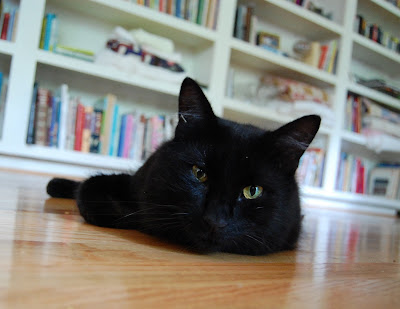 Here is Cleebo, named for the same character in The Aurora County All-Stars. Cleebo the Clueless, I called that character. But this Cleebo is not clueless -- he's wily and crazy like a fox.
Here is Cleebo, named for the same character in The Aurora County All-Stars. Cleebo the Clueless, I called that character. But this Cleebo is not clueless -- he's wily and crazy like a fox.
He stays away for months at a time. Yes, months. He returned at Christmas after an absence of a month, and we rejoiced. He sauntered in, chowed down, and waltzed right back out the door. He was gone for over two months this spring -- we were sure the coyotes that live across the way had gotten him. But here he came on the Fourth of July, still wearing his collar and name tag (with our phone number on it), loping down the driveway like he'd never been gone a day, right past me as I stood in the garden and watched him, my hands full of weeds.
We were overjoyed to see him the first time he came back. We had been so worried about him and had missed him so much. Now, when he shows up again, we hardly move. Someone says, still lovingly (we are suckers for Cleebo, we can't help it), "you ingrate..." as he sashays past us heading for the food bowl. Then I make sure he has his flea meds and is up to date on his shots before he can get back out the door.
He has been in and out since July 4, and I don't know if he intends to stay for a while or not. I've thought about writing about this cat, making up a story for a picture book, but I don't have a strong attachment to that idea, and I need that strong pull to the heart before I can make any story successful, so I'll pass on using Cleebo as a story idea.
So I won't write about Cleebo, and I don't write about my children or grandchildren or even the present day. I tend to plumb my young life for stories instead. I always go where my heart leads me, in trying to tell a story. The craft can and must come later. But if my heart's not in it, if there's not something strongly and steadily pulling me toward writing a story whether or not it ever becomes a book, then I leave it alone -- it's someone else's story to tell.
I've got four or five stories clamoring for my attention right now. I've got to turn my full attention to book two in the sixties trilogy soon, but I think I can work up one of these shorter pieces now. Which one is yakking the loudest? Time to sit down with my notebook and see.
 I have committed raking. I spent all day Saturday outdoors, rake in gloved hands, collecting the fall leaves and depositing them on the garden beds. I love the meditative quality of raking, and my neighbors love it that I rake at least once a year. On all sides of my house I hear leaf blowers on Saturdays, and lawns have a picture-perfect quality to them. "I'm a yard man!" says my neighbor Pat.
I have committed raking. I spent all day Saturday outdoors, rake in gloved hands, collecting the fall leaves and depositing them on the garden beds. I love the meditative quality of raking, and my neighbors love it that I rake at least once a year. On all sides of my house I hear leaf blowers on Saturdays, and lawns have a picture-perfect quality to them. "I'm a yard man!" says my neighbor Pat.
 My yard remains coated with leaves until some warm January morning, when I pick up a rake and give myself permission to take all the live-long day to put the front yard to rights. Pat still likes me. What he and Clarissa and Scott and Elizabeth and even toddler Emma, who is quite my gardening friend, don't know yet is that I plan for the entire yard to be a garden one day, with pea gravel pathways winding around the bee balm, the yard art, and the benches.
My yard remains coated with leaves until some warm January morning, when I pick up a rake and give myself permission to take all the live-long day to put the front yard to rights. Pat still likes me. What he and Clarissa and Scott and Elizabeth and even toddler Emma, who is quite my gardening friend, don't know yet is that I plan for the entire yard to be a garden one day, with pea gravel pathways winding around the bee balm, the yard art, and the benches.
 Until that day, I dream, and January is perfect for dreaming. I'm dreaming about color choices for the house (see my shutters? You can also see how the carport enclosure is coming along), I read cookbooks in bed and dream about recipes I want to make (this is how my Lively-up Yourself Lentil Soup came out -- it was delicious; you can compare my version to Holly Swanson's at 101 Cookbooks)...
Until that day, I dream, and January is perfect for dreaming. I'm dreaming about color choices for the house (see my shutters? You can also see how the carport enclosure is coming along), I read cookbooks in bed and dream about recipes I want to make (this is how my Lively-up Yourself Lentil Soup came out -- it was delicious; you can compare my version to Holly Swanson's at 101 Cookbooks)...
 ...and I dream about the stories I want to write. I moved to this house in Atlanta in June 2004. I came with files, notebooks, and boxes of stories, some of them published books, some of them half-finished orphans, some of them just sketched-out ideas or half-pages of notes. I've added to this stash in the years I've been here. So this week I decided that, in this January dreaming month, I would open my story cupboards and make a list of what I had, so I could get what I still needed as recipe ingredients in order to turn these partial ideas into full fledged stories.
...and I dream about the stories I want to write. I moved to this house in Atlanta in June 2004. I came with files, notebooks, and boxes of stories, some of them published books, some of them half-finished orphans, some of them just sketched-out ideas or half-pages of notes. I've added to this stash in the years I've been here. So this week I decided that, in this January dreaming month, I would open my story cupboards and make a list of what I had, so I could get what I still needed as recipe ingredients in order to turn these partial ideas into full fledged stories.
Or not.
I mean... sometimes you find that you no longer want to write about The Incredible Hulk or gumshoes named Mud, don't you? If I was no longer interested in a topic, out it went, like the moldy corner of cheese still in the dairy drawer of the fridge. But if I got a tiny tingle when I read through the pages of research, the failed drafts, the snippets -- and especially, if it made me laugh when I read it -- I rinsed it off at the sink and I kept that story, tidied it up and gave it a folder all its own, labeled and ready for my attention.
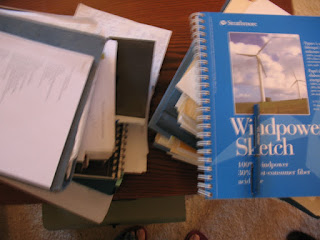
I used a sketch book and colored pens to list all the stories. I didn't go in any particular order, just grabbed pile after pile of papers, and I didn't color code anything; when one marker didn't suit me (or when I got interrupted and came back to my chair), I used another. I drew lines and circles and doodles as I made connections. For instance, I've got one snippet that reads, "I have an office. My associate sleeps at my feet. Her snores are a rhythm I depend on." It made me laugh. I've drawn an arrow from that snippet to this one: "People smell. Have you noticed this?" Ha! This dog (whom I've named Buddy, it seems) also says, "I don't understand fried okra." Who knows what this might someday mean, but I remember when I wrote the second snippet. It was during a freewrite, in Vermont, on retreat.

Have you ever pulled all your work together from wherever you've got it stored, and listed all of it in one place, in one notebook? I filled five pages of my (large!) sketchbook with lists of snippets, ideas, drafts, work-in-progress, rejected stories that I still love, and more. Five pages! I look at these five pages and see that I have been much more productive than I have given myself credit for.
How do you track your progress, in writing? In life? What does success mean to you? Not so long ago, success was survival, for me.
 To be able to sit here, in a home of my own, and look out the windows onto a world of my own making (see the unraked yard?) seems like success enough. To look at these five pages of story ideas -- all of them with potential, because all of them hold a piece of my heart or they wouldn't be on the list -- I think I am rich! I have just needed to rake them up, these ideas, to put them in one place together, in a sort of garden-in-winter, in order to see how hard I've been working at telling my stories, and how much I have done. These ideas aren't going anywhere; they are waiting for me to return to them, waiting for inspiration, enthusiasm, hard work from me. Waiting for me to stop mixing gardening and cooking metaphors, maybe.
To be able to sit here, in a home of my own, and look out the windows onto a world of my own making (see the unraked yard?) seems like success enough. To look at these five pages of story ideas -- all of them with potential, because all of them hold a piece of my heart or they wouldn't be on the list -- I think I am rich! I have just needed to rake them up, these ideas, to put them in one place together, in a sort of garden-in-winter, in order to see how hard I've been working at telling my stories, and how much I have done. These ideas aren't going anywhere; they are waiting for me to return to them, waiting for inspiration, enthusiasm, hard work from me. Waiting for me to stop mixing gardening and cooking metaphors, maybe.
And now what? What do I do with this list? I gave each story a folder. The snippets I put in a folder called "new work." All folders are in one big file drawer now, all together. The research that won't fit into folders is on one shelf, each bit labeled appropriately. That in itself is satisfactory to me. It's satisfactory to create, to organize, to try my best to finish something using all the skills I possess, to revise, to improve, to revise again, to weather rejection to try again, to be finally lucky enough to put a story out into the world, to find readers. Lucky, lucky, lucky.

I did this story gardening work on Monday, January 14, the day of the ALA award announcements. I knew ALL-STARS was not on the list, as I had not been notified, and I stayed away from my computer most of the day and immersed myself in my own stories.
And. you know... part of me had wished, from time to time, for award recognition -- it would be human, of course, and hard not to get swept up in the hoopla for a book that made so much noise in the world and that my publisher (Yay, Sweet Harcourt!) and booksellers, teachers, librarians, readers worked so hard to promote (I guess I did, too!), a book that got such wonderful reviews and such kind attention from readers.
And, if I'm being honest about it, which I'm trying to do, financially it would mean a few years more off the road, too -- a while longer to work at what I love and not take on the proverbial day-job to support the writing (something I've put out there as a goal), and the ability to continue to publish (I have opinions on this, too, but for another time). So, I'll admit that I looked at the possibility, when I looked at it, with more of a practical than emotional eye.
I used to wax romantic about writing and publishing children's books. No longer. This is a business. Years ago, children's publishing occupied a benign corner of the adult publishing realm, where it was patted on the head and not expected to turn a profit. Not so today, of course. The pressure inside publishing houses is intense, and the pressure that writers feel as a result... well, it's a hard business sometimes, and it's best for me to remember that it is a business, and that I am trying my best to make a living and grow a career.
Still, I have steadily learned, in these past few years, to disconnect from the award aspect of publishing and to focus on the page. And I'm healthier for it. I really do know what's important and what feeds me artistically, emotionally, spiritually, even physically... it's time, space, quiet, home, routine, love, family, kinship, peace.
I need these things most of all, in order to create, to be healthy, to live well. So. I wasn't disappointed on Monday: I am making a living in the arts, I am writing well, I am being published, and I have readers, solid reviews, good sales figures!, a great big cheering section, and lots of possibility ahead of me.
What I was on Monday, was curious. Hmmm... and I suppose it's arrogant (I'd prefer to think it's hopeful or naive) to even assume ALL-STARS had a chance for that recognition in the first place. It's all such a puzzle; there are so many good books out there, and I actually have lots of trouble with the whole notion of awards and prizes and bests, being an inclusive sort of gal.
At any rate, I didn't plan (and certainly don't write) for awards. I planned for an introspective, inward-looking, homeward-bound, good-writing year this year (for the first time in seven long years!)... and I will have it. When I came back to my computer at the end of the day, Monday, I found an email about ALL-STARS from an adult reader, an engineer, who I bet has never heard of the the Newbery, the Caldecott, the Printz, and other ALA awards. But he has heard of ALL-STARS:
"I was emotionally connected from beginning to end. True to theme, just about everything in the book resonated with me. Even the Redbug catcher seemed eerily familiar. As a kid I lived and breathed baseball. Played every day until dark; knew all the major leaguers - my favorites being (of course) Sandy Koufax, Willie Mays, Gil Hodges, Yogi Berra, and the rest; - had all the baseball cards; knew all the statistics, etc. My brother and I would lie in our bunk beds at night, room all dark, and quiz each other, What was Ty Cobb's lifetime batting average?, How many home runs did Mickey Mantle hit in 1952?, What is Ted Williams' nickname?
"Early in grade school my teacher took us to the school library and told us all to find a book to read. I wasn't interested. Up until then, reading had just been a rote exercise like spelling or adding and subtracting: Look Dick, See Jane, blah, blah, blah. My teacher, Miss Tremarene (who was also my next door neighbor), said, "Read about something that you are interested in." The concept sort of blew my mind. I said, "Can you do that? Can you read about anything you want to?" She said, "Sure." So I said, "I'm interested in baseball." She helped me find a book. The first book I ever read was The Pee Wee Reese Story! Weird, huh? It changed my life. I've read
non-stop ever since."
Just think: a book (and a teacher) that changed someone's life. It could be any book. It could be the book you write. It needs to be the right book for that particular reader. And the right book for one reader is not necessarily the right book for another.
I asked Kate DiCamillo once, if she'd meant it when she said, at the end of her Newbery acceptance speech for DESPEREAUX, "I know I don't deserve it." Absolutely she meant it, she said. And we talked about how you just never know: who's on the committee, what do they love, how do they interpret the criteria, what can they agree on, and more... it's all so arbitrary. And yet it's not, Kate. I think good work rises up, like cream. I have to believe that. And yet, I get it. There are many good books out there. Many good books in this season alone! There are so many stories. It's a wonder and a treat for readers... I'll never get to read them all.
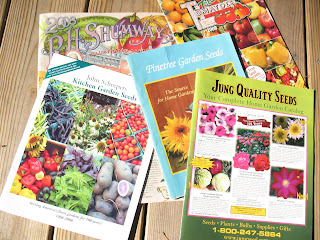
So I look at this year's awards list and I grin. I like it. What I like best about awards is that we get to celebrate our common community, our business of writing and publishing books for young people -- we get to celebrate all our stories.
Then I turn to my notebook listing my five pages of stories, and this time a slow smile spreads across my face. Here are the stories I have control over. Here is my garden. Here are my ingredients. Here is my future, a work in progress.
Time to get to work.

By:
[email protected],
on 1/9/2008
Blog:
One Pomegranate
(
Login to Add to MyJacketFlap)
JacketFlap tags:
home,
notebooks,
press,
the aurora county all-stars,
each little bird that sings,
press,
the aurora county all-stars,
each little bird that sings,
notebooks,
Add a tag
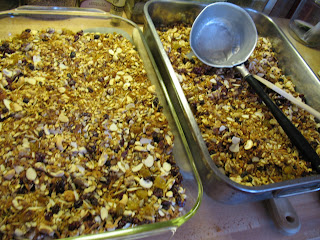 How did it get to be January 9 already? I'll swan, give a girl a chance to hunker in at home, and she starts baking her famous homemade granola that she hasn't made in five years (travel, travel), she roasts hazelnuts and puts them up in saved olive jars, she eats well and sleeps well,
How did it get to be January 9 already? I'll swan, give a girl a chance to hunker in at home, and she starts baking her famous homemade granola that she hasn't made in five years (travel, travel), she roasts hazelnuts and puts them up in saved olive jars, she eats well and sleeps well,
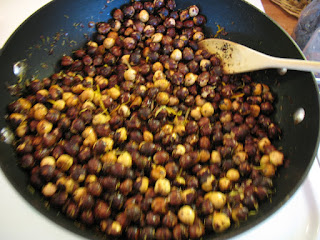
and she hires her friend Jim Williams to enclose the carport and turn it into a gathering room, following her desire to implement pattern 182 of A PATTERN LANGUAGE by Christopher Alexander (who knows this book? I'm using it like a Bible as I work on this house...
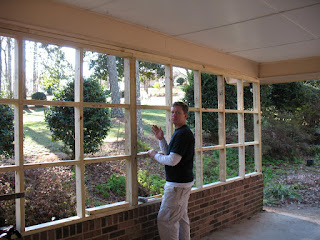 ...I'm investigating Pools of Light (252), Warm Colours (250), Different Chairs (251), as well as Communal Eating (147) and Family of Entrances (102), Entrance Transition (112), Car Connection (113),
...I'm investigating Pools of Light (252), Warm Colours (250), Different Chairs (251), as well as Communal Eating (147) and Family of Entrances (102), Entrance Transition (112), Car Connection (113),
and more, but that will do for now. Ha!)
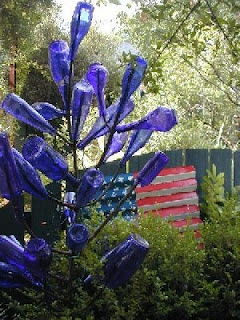
Oh, and she plans to build a bottle tree. (This is a photo of Felder Rushing's blue bottle tree in Jackson, Mississippi. I love Felder and I want a fire bowl like his, but I digress.)
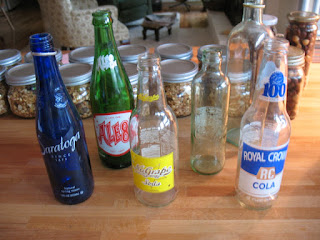
She also opens the mail that has been piling up since the last ice age. And just look what's in the mail! EACH LITTLE BIRD THAT SINGS is still cutting a rug on the book world's dance floor. First news is that LITTLE BIRD has won the Alabama Book Award as the Young People's Book of the Year from the Alabama Library Association! Joy and Happy Day! RUBY won this award in 2004, and I know how special it is, both because I've seen how wonderful this conference is (I've met those wonderful Alabama librarians!) and because I was born in Alabama, so coming back is like going home. But the best thing about this award is that LITTLE BIRD finds its way into the hands of more young readers in Alabama. I'm so glad. Thank you so much, ALLA! (And Tim Berry, I'm trying to email you, but your email keeps bouncing...)
As if Alabama -- and the United States -- weren't enough, here comes news, too, from IBBY -- the International Board on Books for Young People -- that LITTLE BIRD "has been nominated by the U.S. Section of IBBY for the IBBY Honour List 2008 for the quality of its writing."

Be still my heart. IBBY! One of IBBY's objectives is to encourage international understanding through children's literature. Sharon Deeds, chair of USBBY's Hans Christian Andersen committee (the U.S. Section of IBBY) wrote me some months ago, but it wasn't public news until now, and I wasn't sure I believed it, but now I have official confirmation. Sharon had written me: "Each section... nominates three honor books: one for writing, one for illustration and one for translation. The Honour List began in 1956. The books are chosen to represent the best in U.S. publishing in the previous two years."
I'm floored, I'm honored, I'm humbled. And may I throw in delighted... I am. Readers! LITTLE BIRD will have international readers... what a thrill. The entire Honour List from around the world will be part of a traveling exhibition in Japan, the U.S., and Bologna. Then, according to my Official Letter, these books "will be kept as permanent deposits at the International Youth Library in Munich and other research collections in Belgium, Russia, Japan, Slovakia, Switzerland, and the USA."
I knew it. I knew it all along, that everything is connected (as Uncle Edisto says in LITTLE BIRD), that we are more alike than we are different, that we exist in community, through our stories, on this planet. This lovely IBBY award is confirmation and validation of that fact -- just imagine these books, written in many different languages, traveling together next year. Just imagine the kinds of stories they tell individually. Imagine the story they will tell together, of their journey.
Oh, thank you, USBBY committee members, for honoring Comfort Snowberger's story, she who has been to 247 funerals and thinks she knows all about death, only to find out that life is about to take some turns she can't anticipate, and that the most important thing to know about death is that it is part... of life.
There is so much life going on at my house right now, on a warm January day. The carport area rings with hammering and the stapling of screens to the framing. Husband Jim's music wafts up from his basement studio, where he is practicing. The cats want in and out every fifteen minutes. The granola is finished and sits in 12 sweet, squatty little Mason jars, ready for ribbons. The hazelnuts in their jars are standing tall next to the granola. The crepe myrtles that needed to come down (talk about death... sob!) so a new driveway can be built, have been cut and deposited on my back porch so I can gather the most earnest, most enthusiastic branches for my bottle tree.

In the book I'm working on now, a character named Partheny, who is old, wise, and superstitious, makes a bottle tree for her front yard, to ward off evil spirits. I want to make the tree that Partheny would make.
 So I've got my branches now. I've been collecting my bottles. I need the just-right bucket and some cement, I think. Let me see what I can do, gathering these elements that you wouldn't naturally find together, and making something brand new out of them. Sort of like the IBBY award. Sort of like stories. Sort of like life.
So I've got my branches now. I've been collecting my bottles. I need the just-right bucket and some cement, I think. Let me see what I can do, gathering these elements that you wouldn't naturally find together, and making something brand new out of them. Sort of like the IBBY award. Sort of like stories. Sort of like life.
My notebook is getting a workout with LISTS these days. Lists of projects I want to do, lists of supplies needed, lists of administrative tasks that need to be tackled, grocery lists, lists of stories I'm working on or want to work on this year. In January I list. (Well, I list all the time, but in January, especially, I list for myself: what would you like to accomplish this year? How might you make that happen? I start with a fresh notebook for my lists. I know that I'll fill up several notebooks this year, but this is the first for a new year, with lists, including, this year, lists of what I eat each day, how far I walk (I've walked over 25 miles so far this year), lists of my weekly WW's numbers (11.3 pounds so far -- who's still with me? I'm so serious about this...).
Looking at all these lists, I see patterns, too -- it's the same every year; I bring many disparate elements together to create a life. Kind of like my Southern serial-story-turned-into-full-fledged novel, THE AURORA COUNTY ALL-STARS... so many elements and so many characters fairly seething with their wants and needs and aspirations, conspiring separately but finding out that together they make one movement out of whole cloth. You do it, too, don't you? You are interested in so many things, just as I am, you make your lists, either in your head or on paper, and you pull together a life. In doing so, you see how different you are from every other human being on this earth... how different your family is from every other family, how different is your home, your mind! And yet. We are also so alike, wanting to love and be loved, to belong, to achieve something worthwhile, to understand how the world (and each heart) works, to have purpose.
Each of us individually, AND together, makes up the symphony true.
 I'm still processing all I learned at Canterbury Woods Elementary School in Annandale, Virginia (outside D.C.) last month.
I'm still processing all I learned at Canterbury Woods Elementary School in Annandale, Virginia (outside D.C.) last month.
I came to teach personal narrative writing to the upper elementary grades, with a focus on grade 5, since fifth graders take the SOLs, or Standards of Learning, test (The Test) in the spring each year.
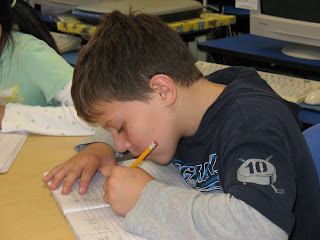 You can see me here, giving some directions to fifth graders, with some prompts written on my chart paper in the background, and an interpreter for the hearing impaired in the background -- at times we had three interpreters in the room at once, all walking around following me when I was walking around... we were like a tiny parade in the classroom.
You can see me here, giving some directions to fifth graders, with some prompts written on my chart paper in the background, and an interpreter for the hearing impaired in the background -- at times we had three interpreters in the room at once, all walking around following me when I was walking around... we were like a tiny parade in the classroom.
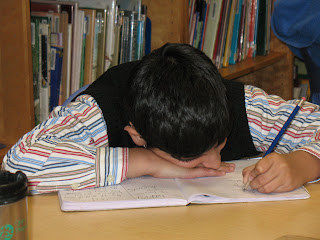
I got used to them quickly, though, and it was clear that the students were used to this.I have been teaching in the classroom for close to twenty years, and I am still learning, still learning. Still re-examining all I have read, all I have been told, all I have experienced. Still discovering my mentors, making my own determinations, finding my own voice.
 It's a thrill to feel myself stretching and growing as I am standing there in front of a classroom of writers, as I have conversations about the day with teachers, as I prepare myself for the next day with students, as they ask me hard questions or struggle with their stories... and I have strong opinions about the teaching of writing, and about teaching, period.
It's a thrill to feel myself stretching and growing as I am standing there in front of a classroom of writers, as I have conversations about the day with teachers, as I prepare myself for the next day with students, as they ask me hard questions or struggle with their stories... and I have strong opinions about the teaching of writing, and about teaching, period.
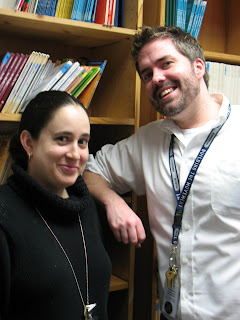 These folks have strong opinions, too. Here are Lisa Vasu, who teaches ESL at Canterbury Woods, and Matt Radigan, who is a counselor and instructional coach. There are three of these instructional coaches/mentors at Canterbury Woods. Principal Barbara Messinger has set up her staff in such a way that she has created a base of staunch support for her teachers and students... and they take advantage of that support. It's fantastic.
These folks have strong opinions, too. Here are Lisa Vasu, who teaches ESL at Canterbury Woods, and Matt Radigan, who is a counselor and instructional coach. There are three of these instructional coaches/mentors at Canterbury Woods. Principal Barbara Messinger has set up her staff in such a way that she has created a base of staunch support for her teachers and students... and they take advantage of that support. It's fantastic.
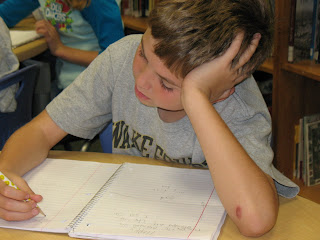
Until I can tell you more, just know that Lisa and Matt are amazing. When students begin to master their English skills, Matt gives them a congratulatory high-five and says, "You've been Vasued!" Matt comes to CW from Teach For America and from D.C. charter schools. He's full of energy, enthusiasm, and smarts. And he has good hair.
I'm still processing all I learned at Canterbury Woods; moreover, I'm processing HOW I LEARNED IT. The environment I was immersed in for four days was an amazingly open and generous one -- the conversations were rich and deep and meaningful. I will never know everything I need to know -- will any of us? -- about the teaching of writing or about improving my own writing, but when I know I am learning something that is key to my understanding, I am exhilarated by the thought.
I am a perpetual student. In every way. As regards the teaching of writing, the best learning labs for me are schools that are wrestling their writing programs to the mat, always learning. They bring me in for a sustained period of time to work with teachers and students. I get to share what I have learned. I learn from them as well.
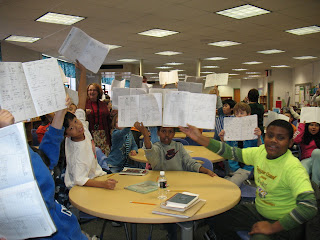 I have had wonderful and difficult experiences in many schools over the past twenty years, but two experiences stand out as the best and worst over that time. And interestingly enough -- both the best and the worst have taught me so much. Life is like that, too -- I guess I shouldn't be surprised that teaching is the same way.
I have had wonderful and difficult experiences in many schools over the past twenty years, but two experiences stand out as the best and worst over that time. And interestingly enough -- both the best and the worst have taught me so much. Life is like that, too -- I guess I shouldn't be surprised that teaching is the same way.
Canterbury Woods is one of the best teaching/learning experiences I have ever had. I'll be sharing with you why I think this is so -- I'll tell you what I learned.
By contrast, one of the most difficult teaching experiences -- and this was just a few years ago, in an elementary school not far from Canterbury Woods -- taught me the most as well. I'll talk about this, too. I remember going home at the end of each residency day and crying with frustration, filling a notebook with what happened and with what I'd learned and with ideas on how I could change things up and make the teaching more relevant, more directed, more prescriptive for this particular environment. It ended up being a great week. It turned me inside out as a teacher and a student.
In the meantime, I'm still processing. Still learning, while I'm enjoying time with my family this holiday season, home home home. I've written more about this on One Pomegranate, which is where I'll continue to chronicle my teaching thoughts in January, and my travels, and more.
Next: How we set up the residency at Canterbury Woods Elementary School, and why it worked so well... how teachers and staff are turning teaching on its ear and giving it a polish --- and what a difference it's making in the growth and learning of not only students, but faculty and staff as well.
There is a Cavafy poem I love called "Half the House." It's about growing and learning, and at first glance it doesn't seem like it makes sense, perhaps, but I find it distills my thoughts about teaching. And living. You can find the poem online, including at One Pomegranate's latest entry, this date.
I'll leave you with Whitman's words from the preface of the first edition to LEAVES OF GRASS. They are the words I use to open THE AURORA COUNTY ALL-STARS:
"This is what you shall do: Love the earth and sun and the animals, despise riches, give alms to everyone that asks, stand up for the stupid and crazy, devote your income and labor to others, hate tyrants, argue not concerning God, have patience and indulgence toward the people, take off your hat to nothing known or unknown or to any man or number of men, go freely with powerful uneducated persons and with the young and with the mothers of families, read these leaves in the open air every season of every year of your life, re-examine all you have been told at school or church or in any book, and dismiss whatever insults your own soul."
Go forth with an open heart. Learn
.
 While I'm recovering from this travel exhaustion/flu/whatever it is, I'm passing on a couple of links for you. The first is from the The Student Printz, the campus newspaper of the University of Southern Mississippi, and it tells you more about the event I just came from, only in much more erudite terms. Great newspaper. Here's the article.
While I'm recovering from this travel exhaustion/flu/whatever it is, I'm passing on a couple of links for you. The first is from the The Student Printz, the campus newspaper of the University of Southern Mississippi, and it tells you more about the event I just came from, only in much more erudite terms. Great newspaper. Here's the article.
The second is a review of ALL-STARS by Donald Harrison for the San Diego Jewish World News. (Their motto: "There's a Jewish Story Everywhere.") I'm thrilled with this review - it's thorough and thoughtful and... different. Here's a bit of it:
-----------------------------------------------

SAN DIEGO—When Jewish families speak reverently about the great Dodgers pitcher Sandy Koufax, typically the story told is about the time that he declined to pitch one particular World Series game because it fell on Yom Kippur. The story reinforced to us as children the point that there are some things more important than the routines in our day-to-day lives, and even more important than our Little League teams.
In this book for young readers, Koufax again serves as an example, but his observance of Jewish ritual has nothing to do with it. Twelve-year-old House Jackson broke his elbow in an unfortunate collision with would-be ballerina Frances Schotz, a major misfortune for the Aurora County All Stars, which perennially lack sufficient players to sustain a full season. Benched, House reads and re-reads a story about a time in Koufax’s career when the Dodger great pitched an important game notwithstanding the fact that he was in terrible pain.
Koufax is only one of the baseball role models in this book; another, similarly important to the resolution of the plot, is Jackie Robinson, the first African-American to play in the majors. In Aurora County, Mississippi, local folks pointed to Robinson and regretfully told the story of the great-grandfather of Frances Schotz—the still living, still athletic, Parting ‘Pip’ Schotz.
----------------------------------------------------
You can find the entire review here. I will say, too, that I knew Koufax refused to pitch the first game of the 1965 World Series because it fell on Yom Kippur. As a writer juggling lots of balls with ALL-STARS (pun intended!), I had to choose what to put in, what to leave out, and I chose to focus on who Koufax was by showing his determination to be the best he could be and to do right by his team, even in the midst of an elbow that turned black, and fingers that were tinged with gangrene -- he never complained, he never explained. He did his job. He retired before he was 30 -- his arm was worn out. He was a stellar ballplayer; he remains a stellar human being. I modeled my character House after Koufax. See if they don't have the same strong, steady, silence, the same dedication to a cause, the same honor and dignity. Koufax is House's hero. My hero, too.
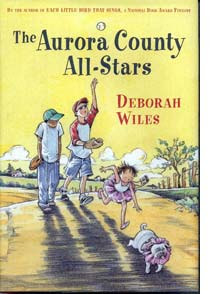 Reviews are so subjective, don't you think? I always say that when a story leaves my hands, it no longer belongs to me. It belongs to the person who reads it, and each reader brings his or her own sensibilities -- her own prejudices, too -- to a book. "It's not for me," is a refrain that a good friend of mine uses when a book is being touted as excellent by so many people, but he just can't see why -- he didn't like it. "It's not for me."
Reviews are so subjective, don't you think? I always say that when a story leaves my hands, it no longer belongs to me. It belongs to the person who reads it, and each reader brings his or her own sensibilities -- her own prejudices, too -- to a book. "It's not for me," is a refrain that a good friend of mine uses when a book is being touted as excellent by so many people, but he just can't see why -- he didn't like it. "It's not for me."
And that's true: Every book is not for every reader. We have such different tastes. But I think there IS a way for readers to read like writers, to learn to appreciate a story for how it is told.
For instance, ALL-STARS is told in the tradition of the Grand Southern Storyteller. It spins out and reels you in. It might even seem meandering or leisurely at points, as one reviewer has pointed out, but then, the writer knows what she is doing, all is purposeful -- she is honoring that southern storytelling tradition, and she is also honoring the serial novel tradition (talk about meandering!) of cliffhanger endings, great suspense, multiple sub-plots, edge-of-the-seat conclusions, a cast of characters to rival ULYSSES, mysteries revealed, secrets kept, betrayals turned to advantage, and... dead guys.
It's a huge undertaking with so many balls in the air to be juggled well, so many ends to tie up (or leave hanging), and so much emotion to be mined -- the Victorian serial novel is not all that different from the Southern gothic! It was grand fun and a great challenge to try my hand at this Southern Victorian Serial Novel Form (as I began calling it) and bring it to young readers.
As a reader, I love to find a story that takes a traditional structure and bends it, shapes it, augments it, gives it a personal stamp. I settle in for the ride, knowing I'm in good hands. Reading like a writer: It's an important skill to master, especially if one is reviewing. "What was she trying to do here? How well did she do it?"
Reading for sheer pleasure is yet another skill. We were talking about this in our NCTE workshop last month in NYC -- reading like a writer, reading for pleasure -- can they be one and the same? How do we read and appreciate what goes into a story well told? Given that we are such different people, how and what do we appreciate, and how does that appreciation carry over into our own writing?
I was delighted to read Donald Harrison's review in the San Diego Jewish World, in part because he had discovered something new to write about, something other reviewers hadn't touched on. There are so many layers to a novel; it's a thrill to see them uncovered by readers. Thanks, Donald Harrison, for this appreciative -- and very different! -- review.
Back to bed for me. Hack hack. Sniff sniff. It has turned cold in Atlanta. We keep a crackling fire going all day. I can sit in front of it for a morning, an afternoon, mesmerized by the flames and the warmth, working away on my laptop from time to time, but not today. Today I must rest this head on a pillow. More dreaming.
 If you only read one Five Easy Questions interview in your whole life, I recommend that you read this Five Easy Questions interview.
If you only read one Five Easy Questions interview in your whole life, I recommend that you read this Five Easy Questions interview.
Instead of hearing advice from one high-class journalist, today we will learn the secrets of four high-class journalists.
How high-class, you may ask? Well, our special guest is Robert Boynton, one of my old professors from New York University. He's written for a few different magazines that you might have heard of: The New Yorker, Harper's, The Atlantic Monthly, The New York Times Magazine, The Village Voice, Rolling Stone, and many, many others.
More recently, Boynton published book called The New New Journalism, asking award-winning journalists for professional advice. Today he shares three practical tips from other writers that could change your reporting style forever.
Welcome to my deceptively simple feature, Five Easy Questions. In the spirit of Jack Nicholson’s mad piano player, I run a weekly set of quality interviews with writing pioneers—delivering some practical, unexpected advice about web publishing.
Jason Boog:
You spent years interviewing the best journalists in the field for your book. Could you explain the three most practical pieces of advice you received while researching that book (including who gave you that advice)?
Robert Boynton:
Although the bulk of the book didn't focus on "tricks of the trade," there were several pieces of advice that struck me.
Continue reading...














































 Reviews are so subjective, don't you think? I always say that when a story leaves my hands, it no longer belongs to me. It belongs to the person who reads it, and each reader brings his or her own sensibilities -- her own prejudices, too -- to a book. "It's not for me," is a refrain that a good friend of mine uses when a book is being touted as excellent by so many people, but he just can't see why -- he didn't like it. "It's not for me."
Reviews are so subjective, don't you think? I always say that when a story leaves my hands, it no longer belongs to me. It belongs to the person who reads it, and each reader brings his or her own sensibilities -- her own prejudices, too -- to a book. "It's not for me," is a refrain that a good friend of mine uses when a book is being touted as excellent by so many people, but he just can't see why -- he didn't like it. "It's not for me."
Deborah,
I loved the part about how a story must pull at your heart... I'm going to use it and quote you on day #1 of my writer's workshop, when school starts. Your blog is going to be an anchor piece as my 4th graders pursue writing this year. Thank you very much.
Leslie
Thanks, Leslie, I'm honored. I'm interested in how you work with your writers in light of having a story pull at their hearts instead of being an assignment to satisfy your particular writing goals and assessments. I think you can do both with the same assignment.